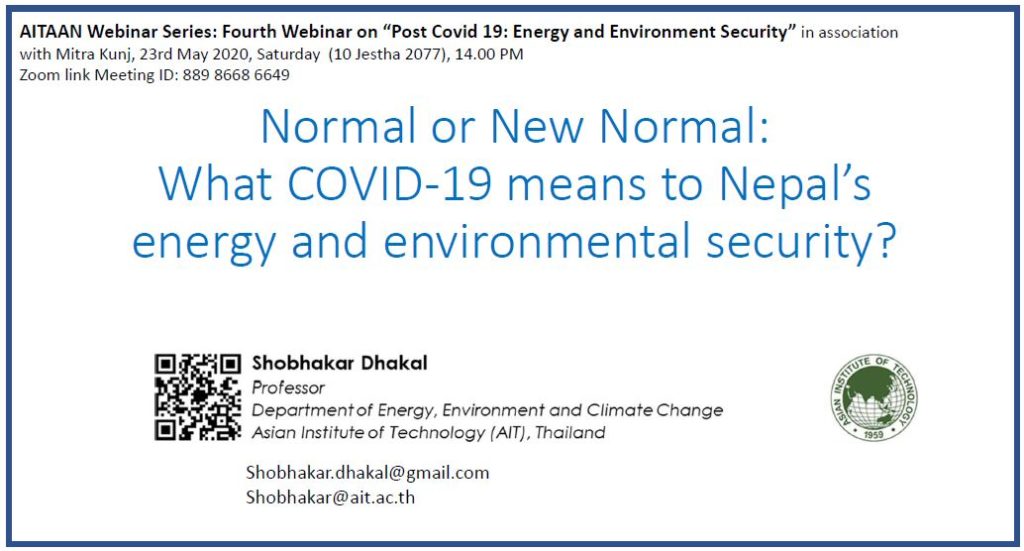In his presentation, Prof. Dhakal presented the latest knowledge on COVID-19’s implications to the global energy and CO2 emissions followed by what is known and unknown and likely implications of COVID-19 to Nepal’s energy and environmental security.
The presentation slides are available here –> Please click to download/view.

He outlined that COVID-19 is likely to induce delays in new power plants slated to be operationalized in this and the next fiscal year and slow the demand for electricity. Revenue loss to state utility, Nepal Electricity Authority (NEA), serious financial implications for Independent Power Producers (IPPs) originating from the demand decline and inability of off-taker (NEA) to make payments timely, changes in price of raw materials, labor and other input costs, and the short to long-term impacts to Foreign Direct Investment (FDI) are likely key implications. However, air pollution has been COVID-19’s unintended co-benefits so far but the extent of air pollution in the atmosphere during the lock-down period is a stark remainder of how difficult is to tame air pollution in cities of Nepal. While noting that COVID-19’s economic impacts will be disproportionate across industries, Prof. Dhakal mentioned that retail, manufacturing, and travel and tourism sectors are especially hard hit. He noted that production and travel and tourism sector collectively contribute closely to 15% of GDP where COVID-19’s impacts are severely felt and will affect for some time. Construction, commerce, foreign remittance and agriculture are also the sectors receiving serious blows from COVID-19 on which Nepal’s GDP heavily relies on. He noted the short-term relief measures that government has out together but emphasized the urgent need for a far-reaching economic recovery packages which would also have indirect effects to the energy and environmental security.
Prof. Dhakal opined that its too early to predict if and to what extent Nepal will have deep structural change and argued that COVID-19 means Nepal must build a resilience energy system and environment planning. Key question he opined to pay attentions are:
(a) How to negate the negative impacts of COVID-19 in the short-run and learn from it?
(b) How to use it as an opportunity as soon as possible for the long-term energy and environmental security?
(c) Owing to surplus electricity, can households switch to electricity for cooking faster under supporting policies of replacing LPG? Can government urgently make a further push for the electrification of transport sector? This will save imported oil ad LPG, reduce air pollution, create local jobs, increase economic and energy resilience. This will aid energy security, Balance of Payment and contribute reducing the trade deficits. More than that, can government develop a wide-arching strategy to use electricity in industries and other sectors to produce ‘value added’ capitalizing on the economic multiplier-effect of electricity to GDP ?
(d) Temporary delay in new power plants likely but can Nepal be able to sell more electricity to India to make short-term gain too? Capacity addition in India may be adversity affected in short run (construction stop, global supply chain issues, payment delays, 15 bn$ projected loss this year to discoms, reduced revenue to hinder capacity of capital expenditure, financial liquidity etc.). Key electricity reforms likely to be delayed in India (such as the real-time market for electricity, scheme for the financial turnaround of discoms, planned auction of coal mines for commercial mining which allowed 100% FDI to attract foreign investors who now may have less interests).
(e) How to ensure that power plants in pipeline are least-affected and the support for the financial liquidity of IPPs and lessen impacts to FDI in hydro-power sector?
(f) How to use this as an opportunity to encourage people to embrace non-motorized modes such as bicycles and provide pedestrian friendly urban settings with supporting policies? These have multiple benefits. While opening gradually after lock-down, can Nepal embolden, facilitate and improve public transportation to save oil and environment?
(g) Can Nepal analyze and implement the lessons learned for air quality during COVID-19 lock-down sooner?
Lastly, Prof. Dhakal emphasized that as Nepal develops economic stimulus packages to address COVID-19’s impacts to the economy, it MUST ensure that energy and environmental security is paid due attentions in these policies as well as public spending than merely business-as-usual economic revival.